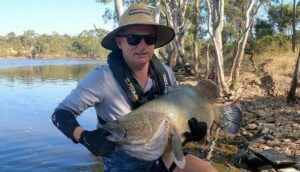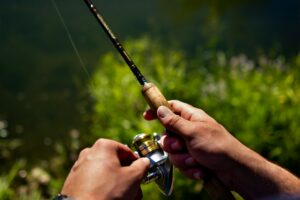Citizen Science
To ensure the sustainability of our fisheries and to better understand our aquatic ecosystems there are a number of ways recreational fishers can get involved by recording their data and observations. The below programs and projects invite recreational fishers to become involved and be ‘citizen scientists’ by just going fishing.
Volunteer Angler Logbook
To help monitor the abundance of fish and the health of our recreational fisheries, fishers can get involved by recording your fishing trips in a volunteer angler log book. Contributing is easy. The data you need to collect included time spent fishing, fishing location, species targeted and caught, fish lengths, number of rods and baits and hook type/sizes used. Information collected is submitted to the Victorian Fisheries Authority to improve the understanding of our fish stocks. If you would like to get involved contact Pam Oliverio at the Victorian Fisheries Authority on (03) 5258 0111 or email [email protected].
Tagged Mulloway
A project funded by your recreational license fees is underway examining the movement patterns of mulloway in Victorian coastal waters and estuaries. If you are fortunate enough to catch a tagged mulloway, record the tag number and total length of the fish and get in touch with us at Nature Glenelg Trust either by phone (0448 139 690) or email ([email protected]). The tags are yellow, approximately 10cm in length and should be located along the top of the body, just below the fourth dorsal spine.
Tagged Whiting
University of Melbourne is undertaking a research project to better understand the movements of Victorian King George whiting to their spawning areas.
Each tag has a unique number, and if a tagged fish is captured record the tag number, location of capture and length of the fish and contact the researchers via email [email protected] or contact the researchers by phone (03) 52583686. The tagged fish can be kept or released again. If you do retain the fish, keep fish frame including the ‘guts’ in the freezer so that project researchers can assess the age and reproductive condition of re-captured fish. Further information see the project blog page.
Cod and Golden Perch Fish Earbone Collection
If you fish for Murray cod or golden perch in the Loddon, Campaspe, Goulburn, Broken or mid-Murray rivers, or Pyramid or Gunbower creeks, you could become an angler scientist.
If you keep these fish to eat, then you could help us by collecting the fish’s ‘earbones’ (or otoliths). This can help us learn more about how fish respond to water for the environment (called “environmental water”) which is actively released into rivers. Fish otoliths are full of information; we hope to collect up to 50 otoliths of Golden Perch and 50 otoliths of Murray Cod for our research, and we may not collect this many in our own surveys. The more otoliths we have, the better our understanding will be of how fish respond to water for the environment.
If you’re keen to help, please contact [email protected] or Mob 0428 335 706.
Redmap – Marine Species on the Move
Redmap invites fishers and divers to report spot, log and map any unusual marine species. Visit the Redmap website or download the app.
Feral Fish Scan
Feral Fish Scan is a new community website for collecting evidence of feral fish. Feral fish (also called ‘pest fish’) cause enormous damage to our rivers and native fish populations. If you have seen or caught feral fish in your local area, record the details here to help identify feral fish hot-spots across our catchment. Visit the Feral Fish Scan website and download the phone app.
Download Fact Sheet
Platypus SPOT
Seen a platypus while you are fishing? Ecologists studying platypus populations would love to hear your reports through Platypus SPOT.
Southern Right Whale Photo Identification Project
Due to recent whale entanglements involving commercial fishing gear, Department of Environment, Land, Water and Planning (DELWP) is inviting the community to participate in a citizen science project which supports its Southern Right Whale research program.
DELWP invites you to submit sighting information and photos of Southern Right Whales which is vital for monitoring and protection of this Critically Endangered species, with around 300 remaining. Fishers are asked to photograph the whale, note the sighting, location and species (if possible) but maintain your distance to 200m. If the whale approaches your vessel on it’s own, then you may take close-up photographs.
To register for the program and upload your photos or sightings, visit: http://www.swifft.net.au/srwsmp/
Visit Water Safety Around Marine Mammals to learn more about marine mammal regulations.




